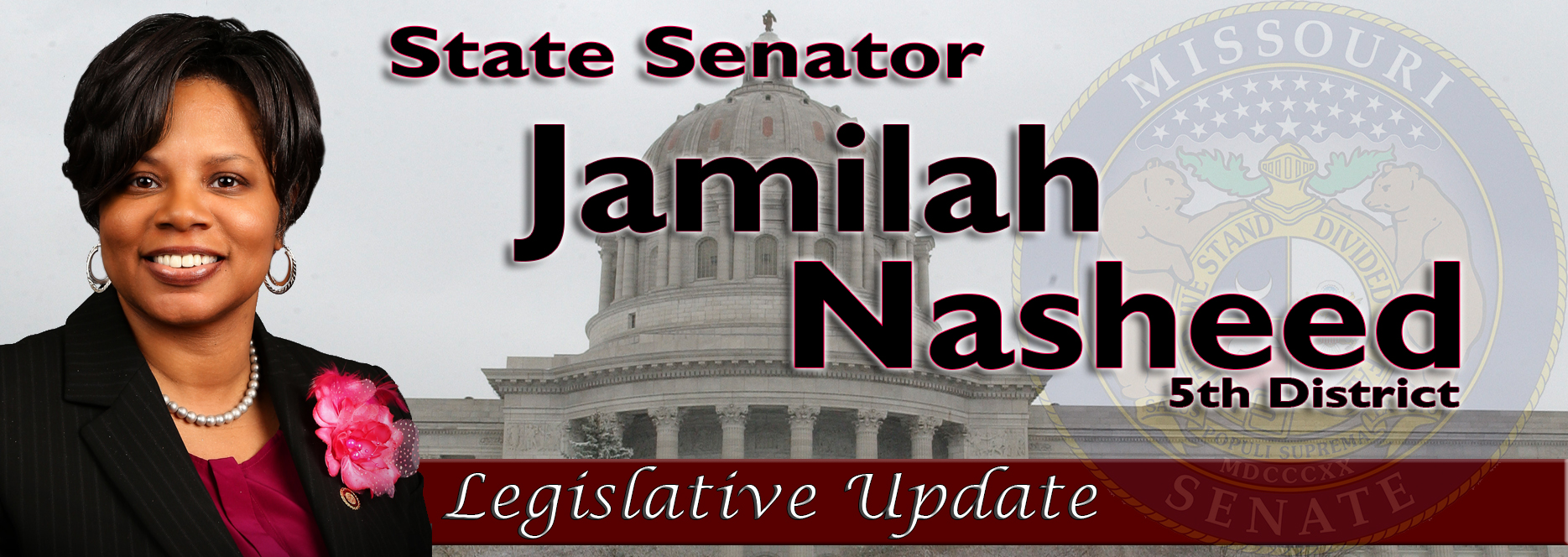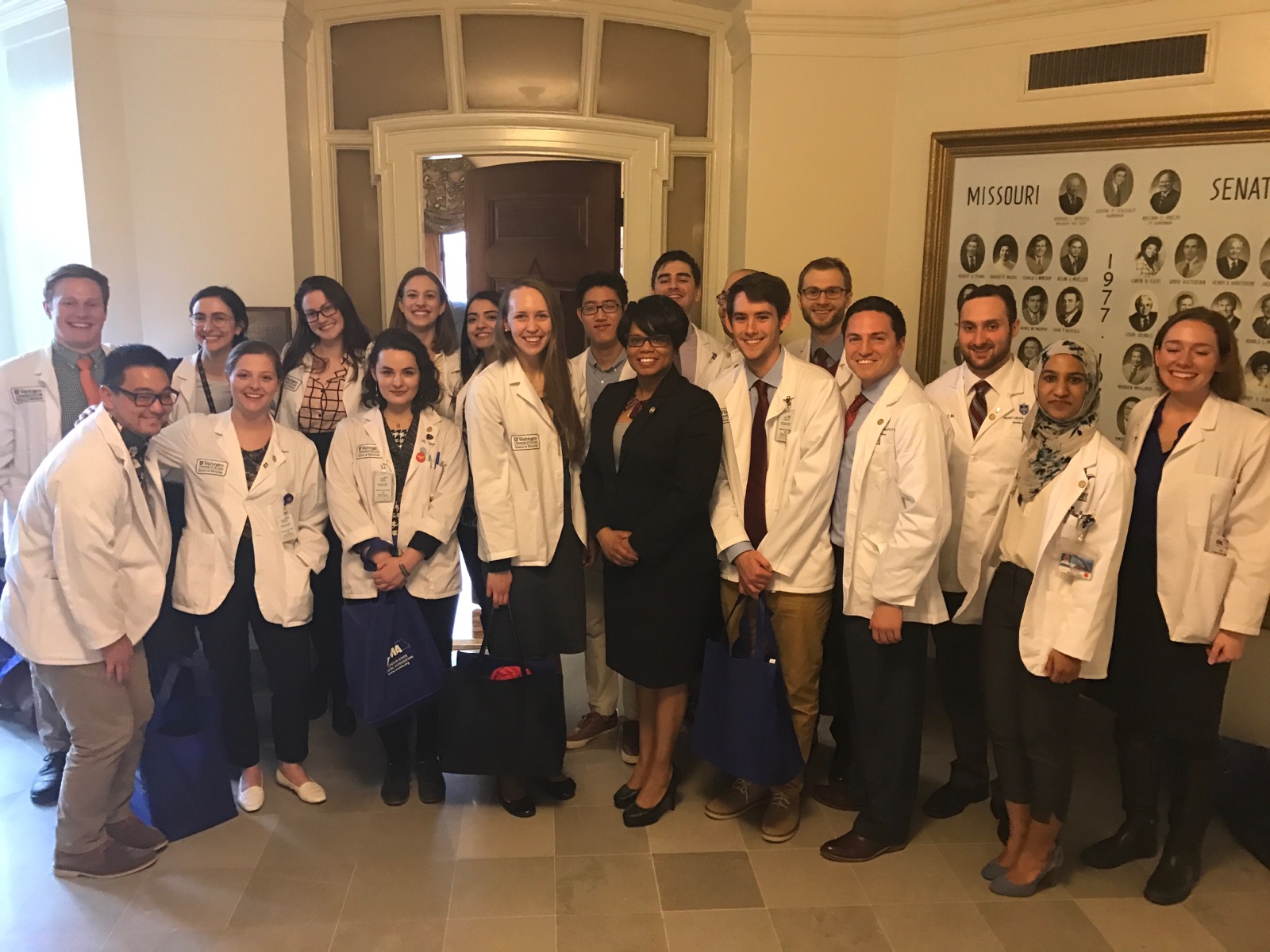
Website | Newsroom | Columns | Legislation
“Happy Friday to you all. This week, I had the pleasure of speaking with some of Missouri’s best and brightest students.
Earlier this week, I met with medical students from Washington University in St. Louis. These passionate and accomplished individuals were engaging and enthusiastic about my legislative priorities — such as passing Senate Bill 52, which would strengthen colleges’ and universities’ commitments to suicide prevention.
Also this week, I discussed the importance of education with primary and secondary students and their parents during the National School Choice Week event held in Jefferson City.  Our educational system is the foundation that supports the rest of a person’s life. We have a responsibility to our community, to our state and to our nation to invest in the education of our youth — our future leaders. When we support students, we are supporting the future of our nation.” – Sen. Nasheed
Our educational system is the foundation that supports the rest of a person’s life. We have a responsibility to our community, to our state and to our nation to invest in the education of our youth — our future leaders. When we support students, we are supporting the future of our nation.” – Sen. Nasheed
On the Floor
Senate Passes Resolution Rejecting Pay Increases
Last week on Jan. 23, the House of Representatives voted 154-5-1 to reject pay increases that were set to take effect on July 1 for statewide elected officials and lawmakers. The House sent the rejection resolution, HCR 4, to the Senate.
Lawmakers faced a Feb. 1 constitutional deadline to reject the raises. If not rejected, the raises would have automatically taken effect starting July 1. It has been nearly a decade since lawmakers and other elected officials have received a pay increase.
On Mon., Jan. 30, after a long and exhausting debate that lasted seven hours, the Senate also passed the resolution rejecting pay increases by a vote of 25-2-6 to stop the raises from kicking-in as scheduled.
Maintaining tradition, Sen. Nasheed voted to reject pay increases for statewide officials.
Under the Missouri Constitution, the state Salary Commission sets the pay rates for statewide elected officials, lawmakers and judges every two years. The new rates automatically take effect unless rejected before a set deadline by a two-thirds majority vote in both the House and Senate.
Lawmakers currently earn $35,915 a year. The Salary Commission had called for them to receive raises of $1,818 that would be phased in over two years. Statewide elected officials would have received more significant increases over two years — a $14,391 bump for the lieutenant governor, $17,929 bumps for the secretary of state, state auditor and state treasurer, a $19,375 hike for the attorney general and a $22,268 raise for the governor.
So-Called ‘Right-to-Work’ bill sent to Governor
The Republican-controlled House of Representatives on Jan. 26 voted 100-59 to grant final approval to legislation that would make it a crime punishable by jail time for business owners to negotiate labor contracts that require workers to pay dues for the union representation they receive. Senate Bill 19, which previously passed the Senate, now goes to the governor, a member of the majority party, who is expected to sign the measure into law.
Before they passed the House version of the so-called “Right-to-Work” bill a week earlier, a bulk of the majority party rejected an attempt by the House minority party to give voters the final say on the issue by putting SB 19 on the statewide ballot. Missouri voters overwhelmingly rejected Right-to-Work when it last appeared on the ballot in 1978.
Under Senate Bill 19, business owners face a penalty of up to 15 days in jail and a $300 fine for requiring all employees in a bargaining unit, including those who choose not to join a union, to pay dues to cover the cost of representation.
Collateral Source
On Tuesday and Wednesday of this week, for a total of 7 hours, the Senate debated Senate Bill 31, which would modify provisions relating to the collateral source rule and provide that parties may introduce evidence of the actual cost, rather than the value, of the medical care rendered.
Under the act, special damages claimed by the plaintiff at trial that have been satisfied by a payment from a defendant, the defendant’s insurer, or authorized representative prior to trial are not recoverable. The defendant is entitled to deduct such payments towards special damages from any judgement as provided in current law.
The bill is essentially meant to ensure that plaintiffs in personal injury cases aren’t awarded damages the defendant has already satisfied, e.g., hospital bills. However, SB 31 also carries the potential unintended consequence of seriously diminishing an injured plaintiff’s ability to secure a fair settlement that is commensurate with the extent of their injuries and the long-term care they may require. For this reason, Sen. Nasheed could not support this bill.
At 5:20 p.m. on Wednesday, the inquiries came to a close. By a vote of 22-11, SB 31 was perfected and ordered printed. It will now go to the House for consideration.
Bills & Committee
Senator Nasheed is proud to share that one of the bills she is sponsoring this year, Senate Bill 52, was unanimously voted out of the Committee on Education as consent, on Tuesday of this week.
This bill, which has been placed on the Senate calendar for third reading, is near and dear to my heart because it deals with an issue of growing concern in our state, that of suicide prevention. “There is much work to be done to help those in our communities who are struggling, and I am honored to be leading this charge in Missouri,” said Senator Nasheed.
Senate Bill 52 would require public institutions of higher education to develop and implement policies that advise students and staff through suicide-prevention programs that are available on- and off-campus. These policies would also inform students and staff about ways to identify and address the needs of students exhibiting suicidal behavior.
Senate Bill 217, was also heard in the Committee on Economic Development on Tuesday of this week. This bill would expand already existing tax credits to also include local soup kitchens. Under current law, taxpayers may receive a tax credit of up to $2,500 for food or cash donated to a local food pantry in the taxpayer’s area of residence.
This act expands that tax credit to include food or cash donated to local soup kitchens in the taxpayer’s area of residence. The next step is for the bill to be voted out of committee, which the senator is hopeful will happen soon.
Other News
Governor Proposes $25.58 state budget for FY 2018
One day before the constitutional deadline for doing so, new Gov. Eric Greitens on Feb. 2 submitted a $25.58 billion state operating budget for the 2018 fiscal year, which begins July 1. Although the governor, a member of the majority party, touted making $572 million in spending cuts from the current fiscal year, many of those cuts are offset by increases elsewhere.
Higher education in particular takes a big hit under the governor’s budget, with a $159 million overall funding reduction, including $116.2 million from general revenue. Of the latter amount, four-year colleges and universities would see a $74 million general revenue cut, with an additional $14 million reduction targeting community colleges.
With K-12 funding, the governor recommends an anemic $3.2 million bump to the $3.35 billion appropriated during the current fiscal year to support local public schools. Under state law, another $48 million is needed to claim full funding of K-12 schools in FY 2018. And that is after the Republican-controlled Legislature enacted legislation last year to cut the amount needed for full funding by $400 million.
The governor’s handling of the budget process to date has been unorthodox. Breaking with generations of practice, he opted not to present his budget during his State of the State address on Jan. 17. When he did so, he made his presentation not to lawmakers but before a preschool class in Nixa.
The Missouri Constitution requires the governor to submit a proposed budget for the upcoming fiscal year to the Legislature within 30 days of the start of the legislative session. The governor pushed that deadline further than any of his predecessors by submitting his budget on the 29th day. The delay by the governor means the Legislature starts the budget process already behind schedule. Lawmakers must pass the various appropriations that will make up the FY 2018 state operating budget by no later than May 5.
